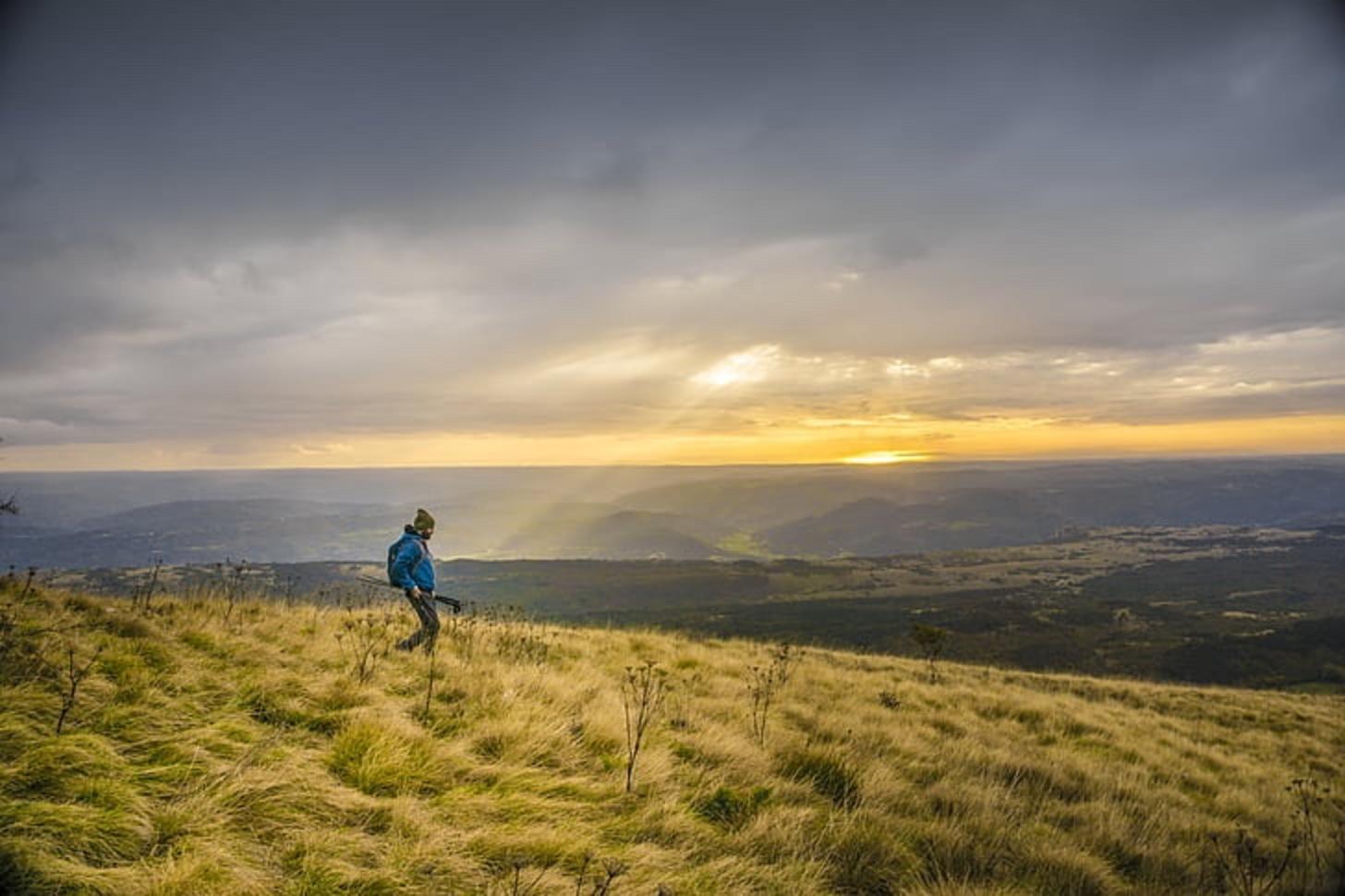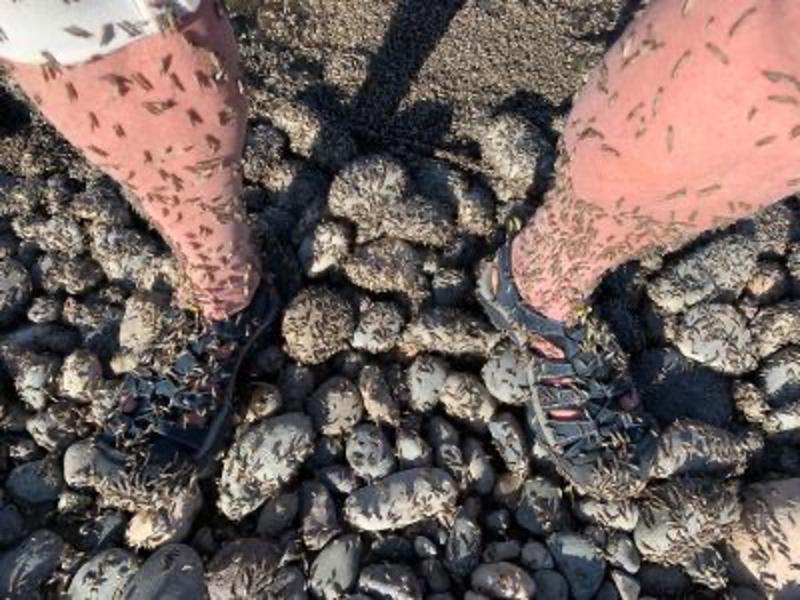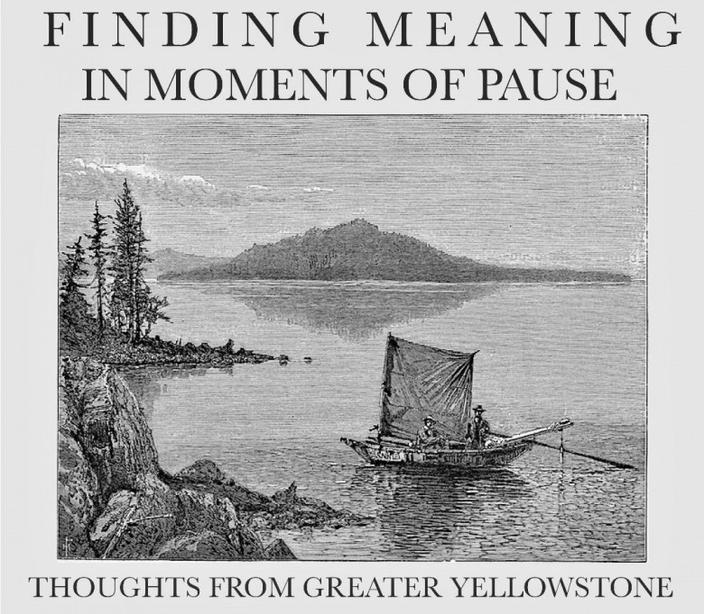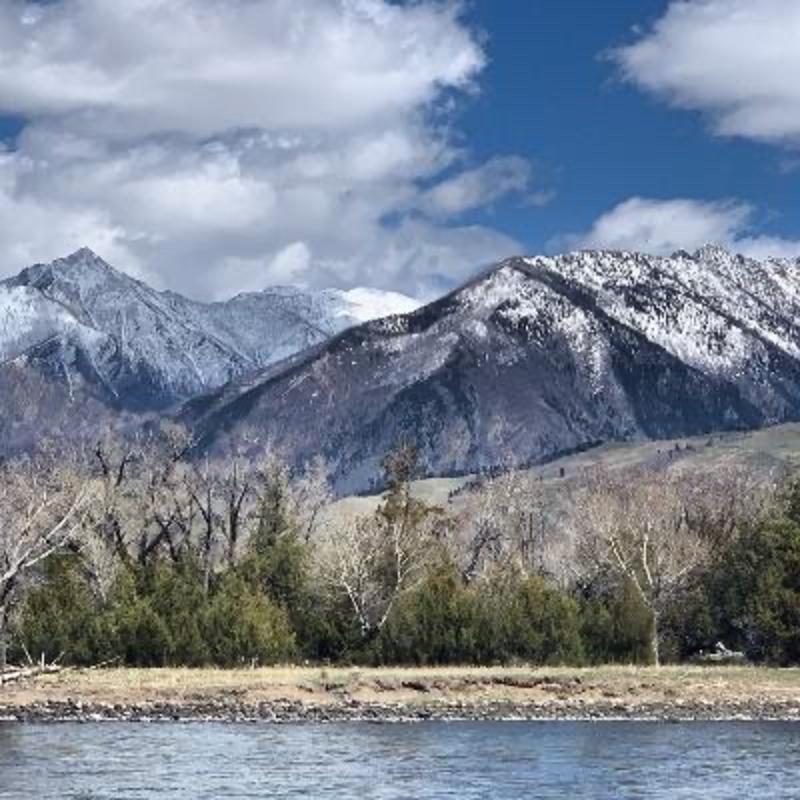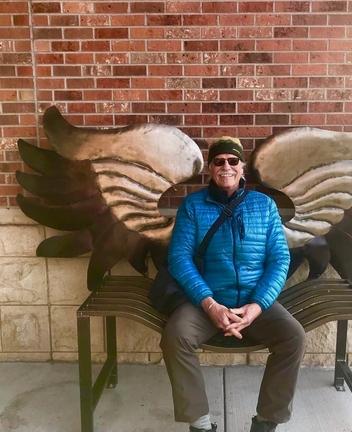Back to StoriesOn Getting Unrattled
Over Mother’s Day, I still carried out what has been an annual tradition. I went to the Yellowstone River in Paradise Valley and camped at a fishing access site working the caddis hatch with a Tenkara rod. Fishing access sites opened May 1, 2020 in Montana, by order of the governor.
May 22, 2020
On Getting UnrattledA psychotherapist confesses his own Covid-19 worries, when even the legendary Mother's Day fly fishing hatch on the Yellowstone River brings no relief
By Timothy Tate
Over Mother’s Day, I still carried out what has been an annual tradition. I went to the Yellowstone River in Paradise Valley and camped at a fishing access site working the caddis hatch with a Tenkara rod. Fishing access sites opened May 1, 2020 in Montana, by order of the governor.
The joy of catching a rainbow trout on a size sixteen caddis fly during the five-minute intermittent hatch chases worry away, granted. Yet this idyllic circumstance cradled by the sight of the Absaroka Mountains is the exception to our daily demands in this interrupted zone of time.
The choice to head out into the grace of the Greater Yellowstone Ecosystem is a timeless way to attain peace and a primary reason we live here.
It’s not that I don’t have otherwise underlying conditions to worry about: plaque build-up in my arteries, a “broken” heart wire, being a prostate cancer survivor (ranked by the urologist’s use of the Gleason Scale as an 8 out of 10 severity), being seventy-two years old, Bi-Polar II, moderate, cancer-induced trauma anxiety, and the effects of having a confidential relationship with scores of folk gnashing their way through a pandemic’s sorrow, loss, and deaths.For many, there is such a draw to the rivers and mountains that they too have become potential hot spots of Covid-19 infection—places where we, feeling euphoric, can let our guard down.
In particular, I reference the two dozen plus 20-somethings camped two sites away from me, who didn’t seem to mind close contact, despite the advisories against it. They even had a live DJ pumping heavy bass until her last set ending at the self-absorbed time of 1:30am.
Typically, I am the guy who goes to campsites and asks for the generator to be turned off or the loud music quieted. But with young adults hopped up and raging? Probably not. I hesitated. I let them have their evening of catharsis. So instead I muttered myself to sleep.
To use a fishing analogy, here’s what my worry hook looks like. Even as a practicing psychotherapist, I, like all of us in this profession, wrestle with our own stuff and I deal with it by undergoing analysis by other therapists.
I tend to swallow the hook designed to attract shame, a sense of inadequacy, whose hackles appeal to my personality. Once the hook is set my perseverating brain smacks its lips in a feeding frenzy of what-ifs.
Covid-19 has stirred up things, I don’t deny it— insecurities that I’ve carried forward on the journey of my life.
This not to say I am unblessed; I am showered with blessings. It’s the rattling that confounds; it contracts my sensibilities and causes momentary amnesia.
We are over two months into this viral circus in the mountains of Montana and I’ve never known anything like it in my life.
° ° ° °
So, regarding Covid-19 and the effect it has had on me and others: I have been rattled. I am rattled. I don’t want to rattle anymore. I want to unrattle.
This is not the confession of a client whom I am listening to, hearing out and expressing the need to liberate angst that was been stewing in a pressure cooker since the winter.
This is how I, a psychotherapist, feel. I feel vulnerable.
While I was camped along the Yellowstone River, there was a song on the radio and it offered this refrain, “I think we might be losing it slightly.” The lyrics were being broadcast into my trailer’s radio and they came via signal from KGLT-FM in Bozeman where I DJ.
Synchronicity it must have been.
Outside my window I saw the rise of the snow-capped Absarokas and in looking at my legs they were sunburned, not long before covered in caddisflies. In that place of solace, I was still rattled.
And I thought, as the song suggests, we might all be losing it slightly. Do you feel it too?
What makes me, maybe us, rattle? I know what makes a rattlesnake rattle: me getting too close. What am I too close to that causes me to rattle? Is it real or psychosomatic? Think about how the new reality of fear pervades in us and how we try to hold it in without an outlet for release.
We are told that we can never go back to what was and we don’t know what lies ahead. If the past doesn’t serve as a stabilizing reference point for going forward then what are we left with?
Covid-19 means we can’t take anything for granted. And for some it has exacerbated the existential fears.
For those of us in our senior years, the fear is associated with a possible abrupt end that was not in the plan—the potential vanishing without having the chance to say proper goodbyes.
Viscerally, if you’ve read about Covid-19’s effects on the body, it’s the thought of drowning lungs.
Walk into the grocer or hardware store and everyone is eyeballing everyone else; the mask wearers and the non-mask wearers. I don’t want to let on to anyone else that I am wondering, if in the exhalations of another, that I might be too close to a viral ball of trouble that is invisibly amongst; engaging my cell receptors, causing my body to soon release infinite phlegm, soaking my lung tissue like a porous sponge in greasy soapy water.
Walk into the grocer or hardware store and everyone is eyeballing everyone else; the mask wearers and the non-mask wearers. I don’t want to let on to anyone else that I am wondering, if in the exhalations of another, that I might be too close to a viral ball of trouble that is invisibly amongst; engaging my cell receptors, causing my body to soon release infinite phlegm, soaking my lung tissue like a porous sponge in greasy soapy water.
Is that it, the source of worry and dread, a cause of death listed on the certificate: drowned lungs?
The symptoms of Covid-19 might be overt, or they might not be. You might feel real sick, or you might not and then suddenly you have to be intubated and put on a respirator.
This leads to constantly conjecturing.
Do I have a temperature? Certainly, my face is hot. Where’s the goddamn thermometer? It’s not here along the river; it’s at home—nice.
Dare I call Susan, my wife, and admit my freak’s on or is it a judicious call?
I am in heading into the middle range of my septuagenarian years, the prime range, they say, that carries vulnerability to a virus that started on the other side of the world. When the President says that if we keep the death toll in this country at around100,000 then we’re “doing pretty good.”
I’ve spent my career seeing tolls of impact, how the loss of a single human soul can have lasting reverberations on the lives of survivors.
Every one of those 100,000 Covid-19 victims had a significant rippling life story with how they navigated the world and touched the lives of others.
Many will have come and gone with no funerals, having endured their final moments without the cupping hand of a loved one. I am not writing this as a political statement, only as a comment on callousness. If the President had to count his daughters or sons among those 100K Americans who went away in the last three months, or were they in need of adequate health care but could not afford it, would he still consider the toll a victory?
I’ve spent my career seeing tolls of impact, how the loss of a single human soul can have lasting reverberations on the lives of survivors. Every one of those 100,000 Covid-19 victims had a significant rippling life story with how they navigated the world and touched the lives of others. Many will have come and gone with no funerals, having endured their final moments without the cupping hand of a loved one.
I remember when I first thought I had Covid-19 but didn’t.
I had walked to work that morning in March when a snow squall ambushed me by the hospital, burning my face, flushing my rosy Irish patina hot. My wife then came to the office and brought the goods—thermometer among them—compassionately gazing at me like the loved one does as the partner is wheeled into Ward Nine. That’s what forty years of wedlock gets you, if by sheer luck, you married your match.
I took the thermometer from her extended hand, unsheathing it. Is its battery still good? Do I push that button on its sleek wand or is that a reset button? How long does it take to read my blazing body temp. Does it beep or do I wait a reasonable amount of time, say twenty minutes? No that’s too long, maybe five. Okay, I take it out and look at the faint digital display: 97.5 degrees.
Is my body temp too low? Am I compensating? I am rattled.
Maybe it’s symptom fever I’ve got. Like the Indie group Car Seat Headrest sings, “I can’t cool down.”
If it’s not one thing with the telltale signs of Covid-19, it is certainly another. Was that a dry cough or a slightly wet one? Was it the Gallatin Valley100-day cough that crawled through the valley this fall or is it really novelcoronacovid19? Why am I so tired all the time? Some days I can barely trudge through the day, tanking at two-ish, only to snail my way to bed by 9. Don’t start drinking Scotch until 8 pm and no more than two shots. No, not three, stop.
Has your sleep been funny, too? If it takes over an hour to cross the river Styx does that mean I am actually preparing for the Big Sleep, holding it at bay by refusing slumber. And how about those nightmares?
° ° ° °
Over at the river, I reflected on the client who shared a nightmare experience.
She said, “As we talked about, I fell asleep the night before my appointment wondering if I should meet with you at your office as you were just beginning in-person appointments again or if I should continue with our phone meetings. I had recently been sick, and though I had recovered, I had a fear of getting others sick. Here is my dream. It was one of those chaotic dreams that seems so hard to describe but is so vivid all at the same time.”
She went on, “I had an overwhelming feeling of being unsafe and fear pervaded my being. I was at a playground. It was dark which seemed odd because it was daytime and should have been light. I was trying to get to the blue door, but there were too many people and I couldn’t seem to reach it. I saw faces of people I knew and faces of people I did not know, but they were all too close. I felt I shouldn’t be there. There was tangible shame and fear. So much fear I would get people sick. I saw you across the way. You were near the blue door. I knew it would be calm behind the blue door, and there would be no people. Behind the blue door was a sacred space. But, I was too afraid. What if I was still carrying the virus? I chose to remain outside of the sacred space in chaos and so alone.”
She went on, “I had an overwhelming feeling of being unsafe and fear pervaded my being. I was at a playground. It was dark which seemed odd because it was daytime and should have been light. I was trying to get to the blue door, but there were too many people and I couldn’t seem to reach it. I saw faces of people I knew and faces of people I did not know, but they were all too close. I felt I shouldn’t be there. There was tangible shame and fear. So much fear I would get people sick. I saw you across the way. You were near the blue door. I knew it would be calm behind the blue door, and there would be no people. Behind the blue door was a sacred space. But, I was too afraid. What if I was still carrying the virus? I chose to remain outside of the sacred space in chaos and so alone.”
She ended up falling prey to Covid-19, like slipping into quicksand. Athletic, wiry, a scientist, single mom of two precocious kids, and loving as a quilt is warm. A client who was infected and now immune—oh, but who can get a test anyway? The thinking now is that even if you got Covid-19 once you might get it again, like the flu.
After her coronavirus tie down this woman experienced a pariah status. Yes, in our town, feeling shunned. “Oh, you have been infected, well, maybe stay away,” some of her friends said. The same alienation known in Puritan times. At the exact moment you need physical or mental comfort, you’re looked upon as dangerous.
This refrain played on her psyche enough to prompt her nightmare. Infected, viral, contagious, indiscriminately fatal, invisible, and now, nearly 100,000 with it are gone. It’s like a Greek tragedy’s choral lament being whispered by Brando in Apocalypse Now: “The Horror.”
What have we learned—what are we learning?
° ° ° °
I see it in my clients. We are acclimating to a new viral reality unconsidered months ago.
Circumstances that create opportunities for mass epiphany and mass revelation are so exceedingly rare. Moments arrive. Collectively, we all have a chance to see the light flash, like when the bomb was dropped on Hiroshima and we vowed that we would create conditions so that we’ve never have to drop another by making the world safer.
Now, with Covid-19, it appears that some are already deep in recrimination. Who to blame or judging whose behavior is abhorrent might offer temporary relief to an over-saturated brain but it offers no satisfaction.
If relief is an unrattled state of mind, how might we attain It?
Here in Montana— and other nearby desirable and remote corners of the West—we blithely speak in platitudes as we say, “Well, we’ll just escape it all by disappearing in nature.”
But there’s always the having to come home again and deal with reality because you cannot hide away in the outer physical world or the one within yourself.
It is not easy to achieve a quiet mind. Much of the self-help pleather suggests a multi-page menu of ways to “achieve happiness,” relief or contentment. And there is always the fall back psychopharmaceutical remedy that allows symptomatic relief.
The goal, however, is not to numb or deflect our feelings.
So, how might we attain an unrattled state during pandemia?
Here is a simple practice: don’t rise to take the worry hook. Don’t obsess. Don’t let the uncontrollable rule your life. No matter how tempting it is to become breathless with pondering the worst that can go wrong, take a pass.
Montana is one of the lowest ranking states in infection and fatalities, with a run of over two weeks with no new cases. We, the citizens of this wildland state, are grateful and dismayed by the overrun parking lots and vehicles with out of state plates at trailheads and river access sites. And damned if we don’t want you all to stay away a bit longer and skip the summer visit to Yellowstone National Park. And isn’t this how an unfortunate “us” vs. “them” scenario sets up?
How do we confront the tension outside and within?
If there is a mental/emotional way through this viral saga it is one of facing your Self—not the small self, the deep one.
I ask clients in my psychotherapy practice to tell their deep story which, for many, comes as a trilogy: there’s The Persona Story—the person we project into the world and the one we want to be seen by others. Next, there’s The Private Story, the one that rattles around in our head when we are alone. And then there’s The Unbearable Story, the one we can’t yet face or discuss, with ourselves and others.
I ask clients in my psychotherapy practice to tell their deep story which, for many, comes as a trilogy: there’s The Persona Story—the person we project into the world and the one we want to be seen by others. Next, there’s The Private Story, the one that rattles around in our head when we are alone. And then there’s The Unbearable Story, the one we can’t yet face or discuss, with ourselves and others.
The Unbearable Story, which we have not yet come to terms with knowing, is the one that, aided and abetted by the stress of Covid-19, leaves us feeling rattled. But coming to understand that story—of how shame, guilty, feelings of inadequacy, believing we are unlovable, or unworthy of receiving kindness by others—is what makes us whole.
We are worthy.
These days, I am asking the people I serve to write the elements of their Unbearable Story. I am not asking them to read it to me, although I will hear it if asked.
We tell the Persona Story for effect. We write the Private and Unbearable Stories for ourselves.
I have alluded to aspects of my story with you in this column because it is important to be honest about our own insecurities as a time when security can be elusive. Am I dealing with fear? Yes, I am.
To make the feeling of being rattled shake a little less, we can find healing within our own stories, rather than spending our precious life energy worrying about a pandemic’s twists and turns or obsessing about any alleged failure of Presidential leadership.
Know this: the unreconciled mind, that has not considered the stories, is vulnerable to infectious thoughts. Imagine an alternative: imagine if we instead tap into our creative self to tell a story unique and true to our character that expresses an authentic encounter with our experience during these times of global realignment.
It involves asking yourself: Who am I. Write a book about it. Do not fill it with trite axioms, or New Age platitudes but with raw reflections, or of experiences that are imprinted upon you, soul-seizing poetry or astonishing laments.
I fear that if these stories aren’t encouraged and shared then we will be burdened by stories of resignation. If ever there was a time to pass on the self-pity story.
My heart weeps compassion for those among us who have suffered either the coronavirus itself like Mountain Journal columnist Sarah DeOpsomer wrote of her and her husband’s Covid-19 experience or those who have lost one of the 100,000 loved ones. I cannot fathom how ripped open lives smacked by this virus it must be.
And for you, along with the front line health care workers, I close with this: during our isolated moments of quiet desperation that impinge on our peace of mind I remember that my worry is not to be trusted, that my past is just that, and that my dearest trusted resource comes from the people I love and who love me in return.
Open your eyes today. See those people in your life. Give them the love they need. Let their love for you sink in. In the end, one of the things that really matters is to be felt seen and, as our gift of love, to see others in return. It’s how we stay unrattled.

